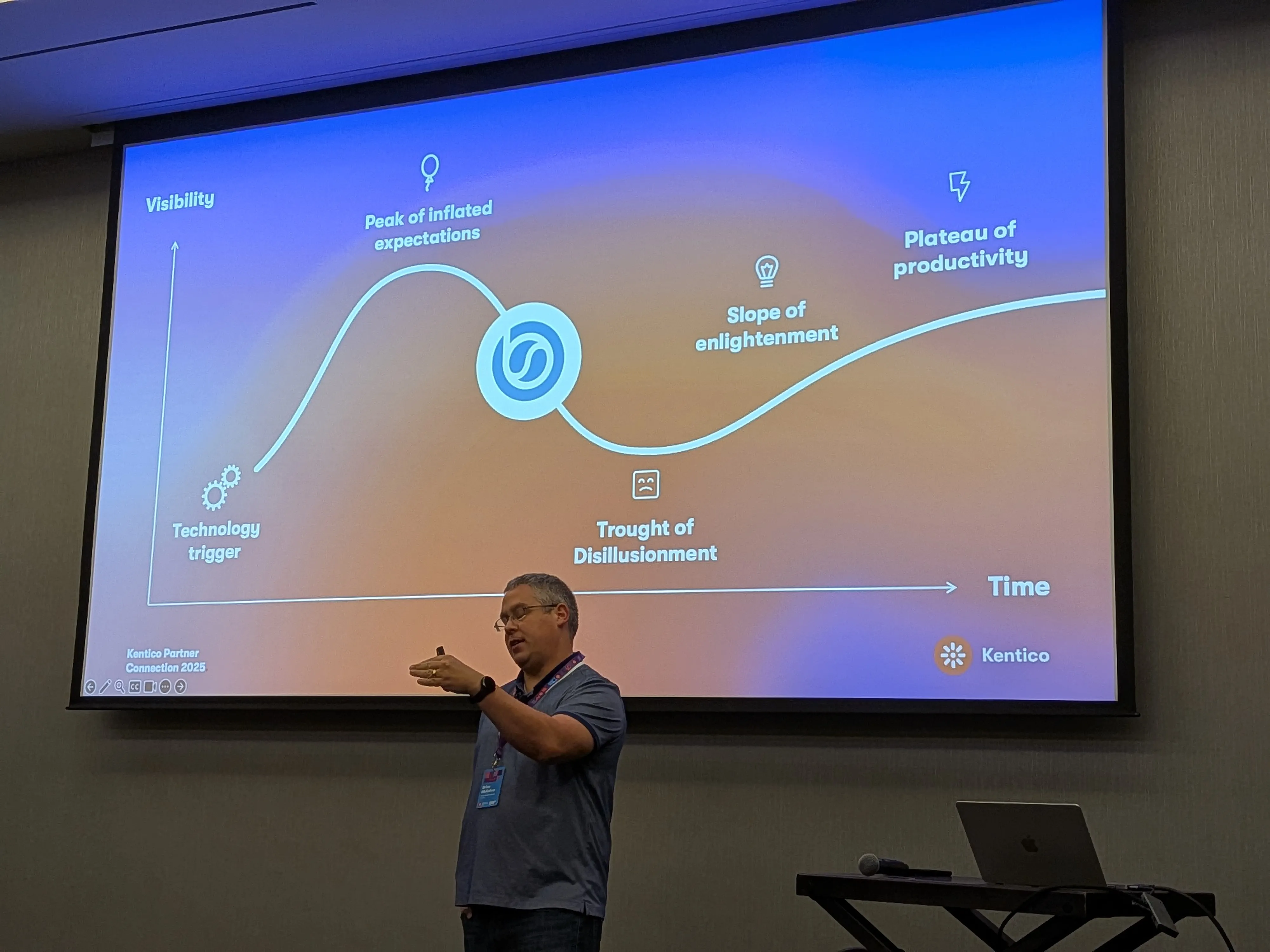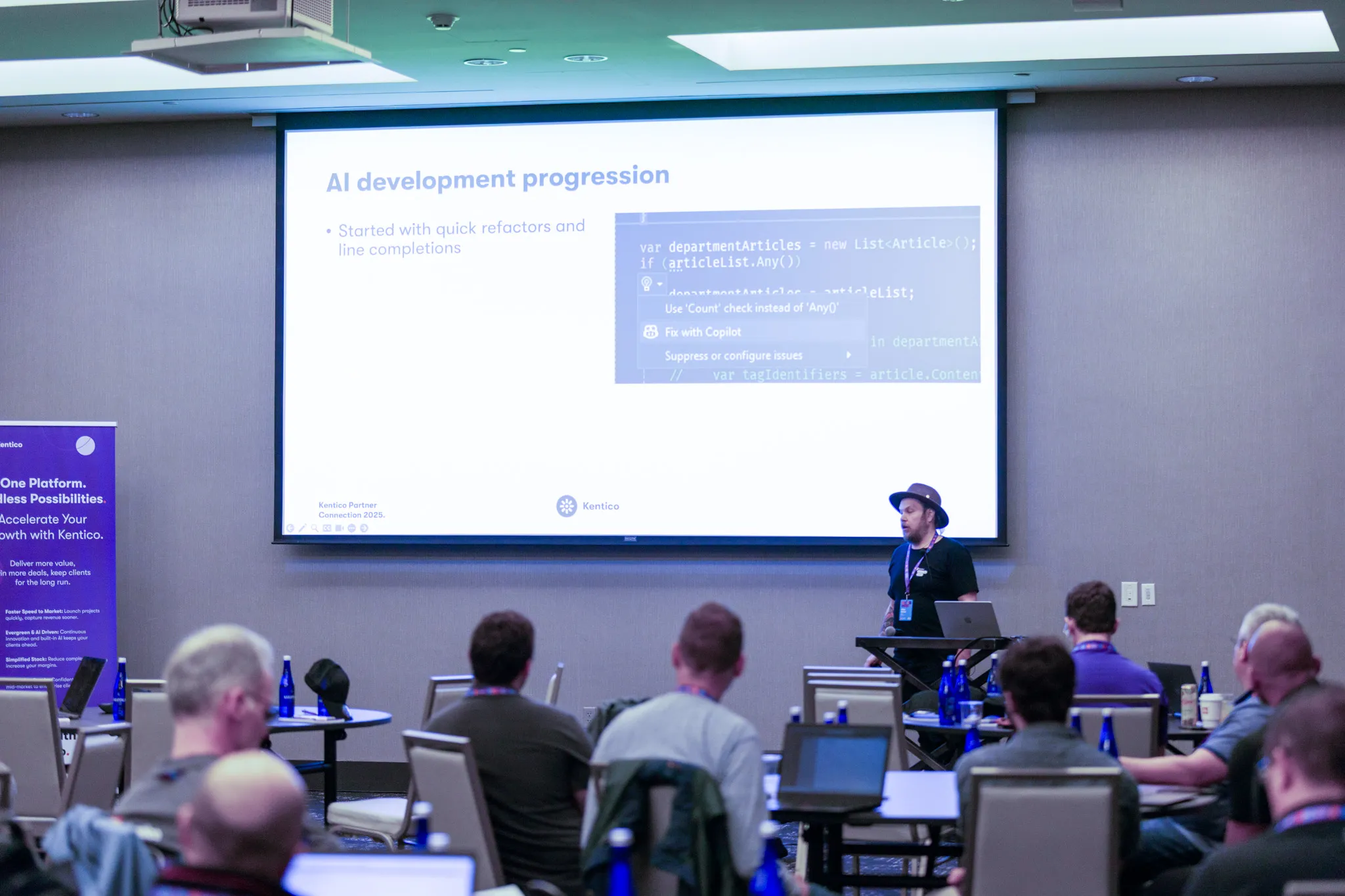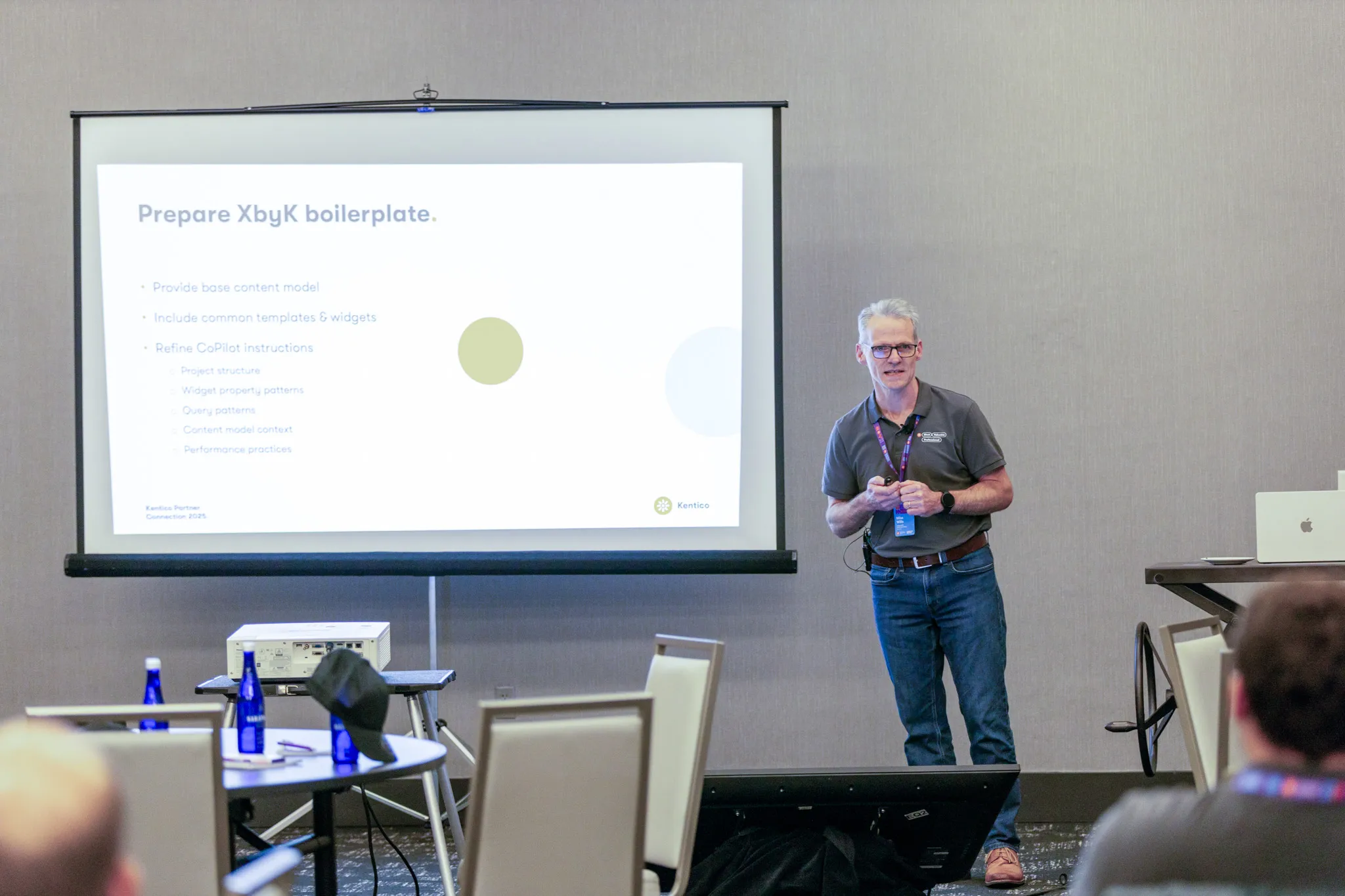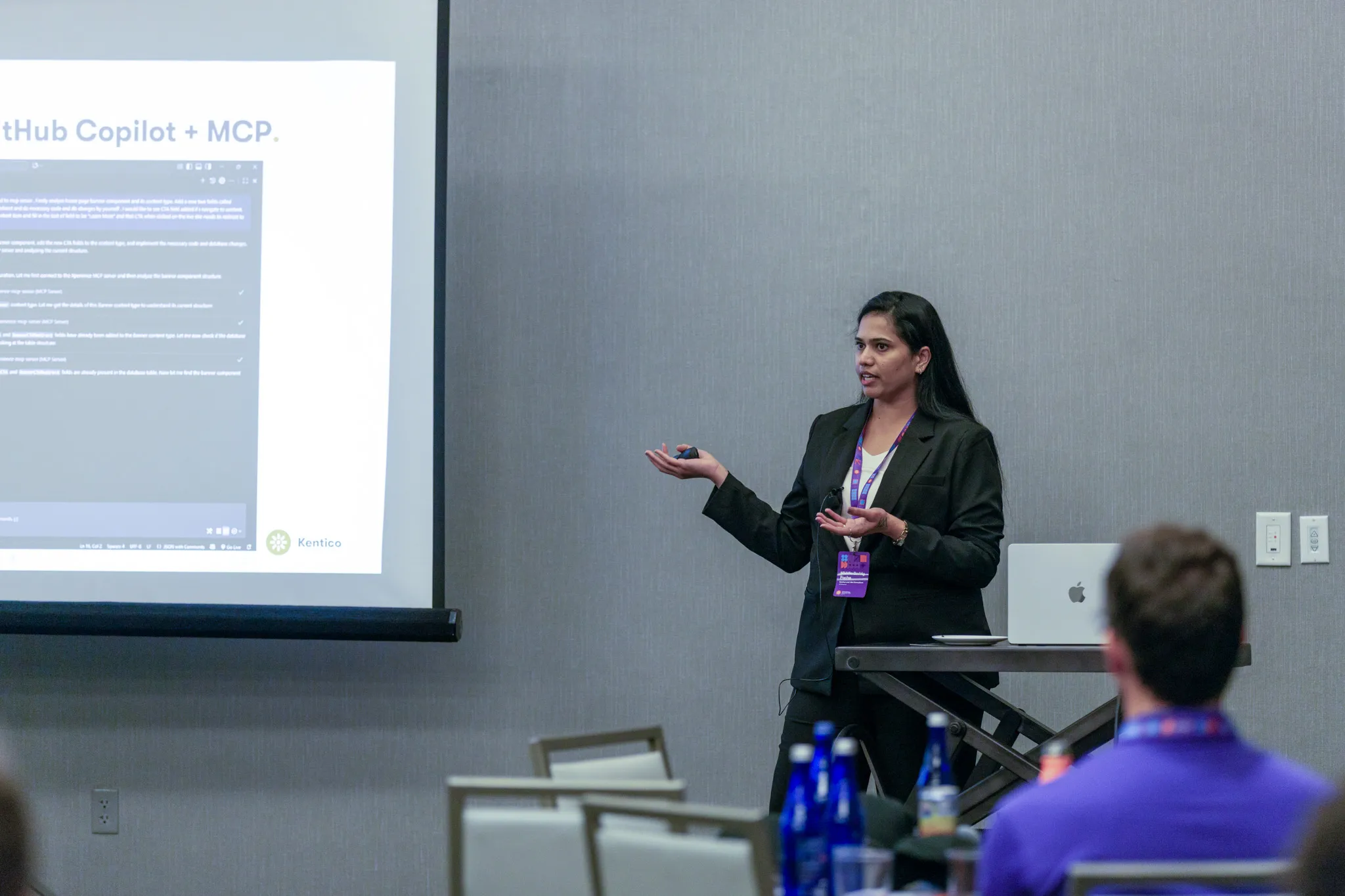When we met our North American partners in Burlington for Kentico Connection 2025, one theme stood above the rest: AI is officially moving from being hype to being helpful.
This year, I noticed that the conversation has shifted from mixed excitement and scepticism to execution, from individual exploration to a more formalised strategy. Our partners shared what AI really means for their agencies, developers, and clients right now: not a threat, but a transformative toolkit for faster delivery, smarter collaboration, and better digital experiences. The insights they shared revealed not only where AI is helping them, but how it’s changing the rhythm of their digital work.
The AI Decision Playbook
BizStream’s Brian McKeiver kicked off the discussion in our technical track with a truth we could all feel: the AI gold rush is over, and now it’s more about the meaningful adoption of agentic software development practices instead of debating the hype.
His talk, “From Hype to Helpful: AI Decision Playbook,” explored how developers are incorporating AI into their daily work and gradually shifting from perceiving AI more as a a helper than as a novelty. Most of his team are using AI coding assistants like GitHub Copilot, Cursor IDE, or LLM chat tools to handle repetitive or boilerplate tasks.
In Brian’s experience, teams are starting to move faster, and in a more informed and methodical manner. It appears that AI is here to stay, but it’s only helpful when applied to the right problems.
That mindset mirrors Kentico’s own product approach to AI — grounding innovation in practical impact rather than chasing the latest trend or so-called ‘AI-stuffing’.
AI as the Developer’s Context Engine
Kentico Community Leader, Mike Rahel from Refined Element, offered a perspective that many independent consultants can relate to. As a self-taught developer working solo, he described AI as his “context engine” - a tool that connects the dots between codebases, documentation, and community knowledge.
Using Copilot, ChatGPT, and now Kentico’s Model Context Protocol (MCP) server for documentation, he is reshaping his development workflow:
· Debugging complex logic in minutes instead of hours.
· Automating repetitive coding tasks.
· Using AI to understand version differences and apply best practices faster.
From Mike's perspective, AI doesn’t replace his experience, it amplifies it as long as it has been fed the right context.
It’s why Kentico’s approach to agentic software development support emphasizes the provision of the Kentico context - its MCP documentation server delivers best practices, recommendations, API examples and advice direct to developers working with AI-enabled code editors, without them having to know about their availability in advance or go hunting through documentation to find them.
But Mike’s experience emphasizes an important principle: humans and AI are better together.
Agentic Development in Action
BlueModus’s Mike Wills took us a step further into the future, demonstrating how AI is now an active participant within their agency’s project implementation process. AI agents autonomously perform tasks under human oversight and are now able to orchestrate many steps in their project implementation process, such as:
1. Exporting HTML and components from Figma.
2. Analyzing content models.
3. Automatically generating GitHub issues.
4. Assigning those issues to AI agents for code generation.
The outcome was impressive, and attendees were inspired by their achievements:
· Fully functional, standards-aligned widgets and templates for Xperience by Kentico.
· Faster project setup and fewer manual handoffs.
· Improved consistency across large-scale builds.
But journeys are never completely smooth, and Mike took us through some of the challenges or hurdles they have had to overcome in the process. He noted, for example, that broad, unstructured prompts led to disappointing results. The lesson learned being that smaller, context-rich microtasks delivered a more reliable quality. So, make sure you break tasks down into smaller chunks!
At Kentico, this approach completely aligns with how we apply our own internal agentic development process as well as our approach to AIRA agents. Not only should agents execute according to user-defined plans and appropriate context, they also need to adhere to both agent and human user permissions.
Busting the “Front-End Only” Myth
Nikhila Reddy Pocha from K2 America tackled a common misconception: that AI tools are only useful for front-end developers using frameworks like React and languages like TypeScript.
In her talk, “Advancing Development with AI: From Code to Collaboration,” she showed the audience that AI is stack-agnostic and therefore equally capable of accelerating .NET Core and Xperience by Kentico projects. AI’s impact isn’t limited by language or framework; it’s limited by how we use it.
Sharing her own experiences as a developer, she recommended:
· Context-first prompting: Feeding AI the right information to avoid “hallucinations.”
· Iterative collaboration: Treating AI as a partner in problem-solving, not a one-click answer.
· Human validation: Always reviewing, refining, and owning the output.
Her presentation resonated with me. AI doesn’t necessarily change how we code - it changes how we think while coding, and how we better articulate our requirements.
Key shared learnings
Across all the sessions and networking discussions, a clear set of themes emerged. AI is most effective when:
1. It’s grounded in real project context.
2. It’s guided by human expertise.
3. It’s embedded in existing workflows, not forced onto them.
These themes and recommendations align well with our AI strategy for Xperience by Kentico:
· Improved context through the provision of our MCP documentation server.
· Reduced coding through the KentiCopilot developer toolkit.
· Practical applications of AI to help marketers, editors and developers to scale their business, improve team efficiency and respond quickly to market changes.
But that wasn’t all we learned from one another. We learned that like every new technology, AI takes time to learn how to apply it for best effect. This transformation comes with adoption challenges and knowledge gulfs between members of your development team. AI represents change and change can be scary.
Collaboration, Not Competition
Perhaps the most powerful takeaways from Connection Boston was the optimism of our partner community. Despite the uncertainty surrounding AI, their message wasn’t one of fear. Rather they displayed curiosity, creativity, and community, emphasizing once again that we are better together.
They weren’t asking how to defend their value in this changing market; they were thinking about how to extend it. From BlueModus’s orchestrated bots to BizStream’s adoption playbooks, we’re seeing agencies redefine delivery models, create new service offerings, and unlock new revenue streams through AI-enabled efficiencies and creativity.
Agencies in our partner network aren’t fearing AI; they’re testing it, improving it and willing to share their experiences with one another. And as they do, Kentico will be there to help inspire them and empower them to go even faster.
That’s why the heart of Kentico’s commitment is focused on helping partners get their clients to market faster - with confidence, transparency, and shared success.
From Content Management to Context Orchestration
AI is changing the digital experience market forever. We’re moving from simple content management to context orchestration where your marketing technology starts to understand what users are doing, why they’re doing it, and responding instantly with meaningful, relevant experiences.
This is where our roadmap leads: a platform that collects, interprets, and activates data to create personalized, dynamic experiences across every channel - but always with human creativity and oversight at the core.
Because at Kentico, we believe that AI amplifies human expertise.
In Conclusion
Kentico Connection North America 2025 showed what real-world AI looks like in action. It wasn’t theory, nor was it hype, rather it was hands-on experimentation from the people building the future of digital experiences.
Our partners aren’t waiting for the AI revolution; they’re already leading it. They’re sharing what’s working and what needs refining with each other, and importantly, they’re defining what’s next. And together, we’re making sure the next era of digital experience is faster, smarter, and more human than ever before.
The era of hype is over. The era of AI that helps has begun.

Debbie Tucek
VP Product at Kentico. Product team leader, and former Marketing Executive, with more than 10 years’ experience across the product management and marketing spectrum – from startups to large organizations - I’m passionate about designing cloud software products and end-to-end services that customers love to use. My superpowers include my unending passion & enthusiasm for what I do and the problems my products solve, and my ability to project this passion to motivate others, be that in grooming sessions or on the international stage.




.webp?language=en-US)